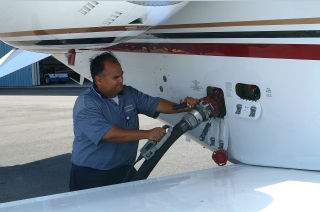Thu, Mar 14, 2024
Fuel Tax Increases Prove Quite Unpopular With Industry
General Aviation Manufacturers Association President Pete Bunce weighed in on the Biden administration's plans for Fiscal Year 2025, finding issue in the same elements that similar bodies in the aerospace industry have.

The FY2025 plans really aim to crack down on private and non-commercial aviation around the country, stacking new taxes on jet fuel and increasing scrutiny on corporate operations. Bunce appealed to some good ol' "we're on your team, here!" talk as an opener, saying “The industry has supported the Biden-Harris Administration in strengthening safety, furthering workforce investments and enhancing sustainability of the sector," following up with gratitude for "the President’s Budget prioritizes investment in the FAA to improve certification and oversight, and address air traffic workforce and facilities and equipment issues."
After getting the pleasantries out of the way, Bunce dives in to the real issues, calling it "disheartening to see that short-sighted political proposals are now being put forth that can set back our industry with consequences that harm our indispensable workforce, the very same men and women in the United States manufacturing sector that the Administration claims to emphatically support."
“The political soundbites of closing the so-called corporate jet loophole and drastically increasing the jet fuel tax, by nearly five times, does nothing more than harm demand for state-of-the-art aircraft that are called ‘business jets’ or ‘corporate jets’ for a specific reason. These vehicles facilitate efficient mobility for businesses to create jobs throughout our nation, particularly in communities underserved by commercial service. Why would the Administration want to hurt workers who make these aircraft or those communities that benefit from the jobs and/or mobility these vehicles enable?"
To bolster the argument, he shores it up with some stats regarding the greater economic impact of the industry.
“It is important to note that general and business aviation supports $247 billion in total economic output and 1.2 million total jobs in the United States. The industry fosters and provides critical transportation options to companies and organizations of all kinds and sizes, including nonprofits, agriculture, emergency response, forest fire suppression, law enforcement, humanitarian services and government agencies."
“While the President’s Budget is an outline of the Administration’s priorities, we encourage Congress to have a more constructive approach as it works to set and pass the budget for the federal government in the coming fiscal year. In the meantime, GAMA will continue its staunch advocacy of our world-class manufacturers and workforce, demonstrating the utility and importance of the industry and its great manufacturing jobs before the Administration and Congress.”
More News
Decision Altitude (DA) A specified altitude (mean sea level (MSL)) on an instrument approach procedure (ILS, GLS, vertically guided RNAV) at which the pilot must decide whether to >[...]
Aero Linx: T-34 Association, Inc. The T-34 Association was formed in July 1975 so that individuals purchasing then military surplus T-34As had an organization which would provide s>[...]
As He Released The Brakes To Begin Taxiing, The Brake Pedals Went To The Floor With No Braking Action Analysis: The pilot reported that during engine start up, he applied the brake>[...]
“Legislation like the Mental Health in Aviation Act is still imperative to hold the FAA accountable for the changes they clearly acknowledge need to be made... We cannot wait>[...]
Also: IAE Acquires Diamond Trainers, Army Drones, FedEx Pilots Warning, DA62 MPP To Dresden Tech Uni The danger to the flight training industry and our future pilots is clear. Dona>[...]
 ANN's Daily Aero-Term (12.08.25): Decision Altitude (DA)
ANN's Daily Aero-Term (12.08.25): Decision Altitude (DA) ANN's Daily Aero-Linx (12.08.25)
ANN's Daily Aero-Linx (12.08.25) NTSB Final Report: Piper PA-31T3
NTSB Final Report: Piper PA-31T3 Aero-News: Quote of the Day (12.08.25)
Aero-News: Quote of the Day (12.08.25) Airborne-Flight Training 12.04.25: Ldg Fee Danger, Av Mental Health, PC-7 MKX
Airborne-Flight Training 12.04.25: Ldg Fee Danger, Av Mental Health, PC-7 MKX



